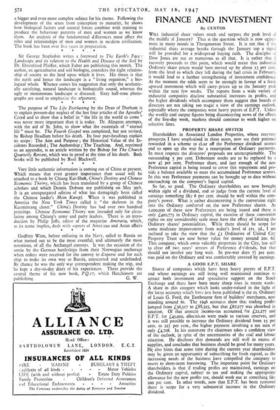FINANCE AND INVESTMENT
By CUSTOS
WILL industrial share values reach and surpass the peak level of
i the middle of January? That is the question which is now upper- most in many minds in Throgmorton Street. It is not that if the industrial share average breaks through the January top a signal will be provided for a widespread buying rush. The disciples of Dow Jones are not so numerous as all that. It is rather that if recovery proceeds to this point, which would mean that industrial Ordinary share prices would have moved up by about 13 per cent. from the level to which they fell during the fuel crisis in February, it would lead to a further strengthening of investment confidence. At the moment the odds seem to be strongly in favour of a fresh upward movement which will carry- prices up to the January peak within the next few weeks. The reports from a wide variety of industrial companies disclose substantial increases in profits, and the higher dividends which accompany them suggest that boards of directors are not taking too tragic a view of the earnings outlook, especially where the companies were heavy payers of E.P.T. Unless the weekly coal output figures bring disconcerting news of the effects of the five-day week, markets should continue to work higher on selective lines.
PROPERTY SHARE SWITCH
Shareholders in Associated London Properties, whose reccvery prospects I have emphasised in these notes, now see their patience rewarded in a scheme to clear off the Preference dividend arrears and to, open up the way for a resumption of Ordinary payments. In most respects the directors' proposals are unexceptionable. The outstanding 5 per cent. Debenture stocks are to be replaced by a new 44 per cent. ' Preference share, and just enough of the new Preference capital is being issued to cover this repayment and pro- vide a balance available to meet the accumulated Preference arrears. In this way Preference payments can be brought up to date without encroaching on the company's liquid capital.
So far, so good. The Ordinary shareholders are now brought within sight of a dividend, and to judge from the current level of earnings something like 6 per cent, should be well within the com- pany's power. What is rather disconcerting is the conversion right into the Ordinary conferred on. the new Preference shares. As 1,000,000 -of these new Preferences are being issued and there is only £400,775 in Ordinary capital, the exercise of these conversion rights on any considerable scale must have the effect of limiting the Ordinary shares' potentialities. While there should be scope for some moderate improvement from today's level of 21s. 3d., I am inclined to take the view that the Li Ordinaries of United City Property Trust are now better value for money around 20S. 6d. This company, which owns valuable Properties in the City, has still to clear off two years' arrears of Preference dividends, but that should not involve any long wait. In pre-war days 72 per cent. was paid on the Ordinary and was comfortably covered by earnings.
A GOOD E.P.T. SHARE
Shares of companies which have been heavy payers of E.P.T. and whose earnings are still being well maintained continue to attract both investment and speculative support on the Stock Exchange and there have been many sharp rises in recent weeks. A share in this category which looks under-valued in the light of the latest accounts which have just been published is the as. Ordinary of Louis G. Ford, the Eastbourne firm of builders' merchants, now standing around 6s. The 1946 accounts show that trading profits jumped from L36,517 to £88,325, but that £67;277 was absorbed in taxation. Of that amount income-tax accounted, for £22,277 and E.P.T. for £45,000, allocations were made to various reserves, and it was still possible to increase the Ordinary .dividend from 15 per cent. to 224 per cent., the higher payment involving a net sum of only £4,708. In his statement the chairman takes a confident view of the outlook, in spite of the uncertainties of the coat and labour situation. He discloses that demands are still well in excess of supplies, and concludes that business should be good for many years. He also hints that some time during the current year shareholders may be given an opportunity of subscribing for fresh capital, as the increasing needs of the business have compelled the company to resort to short-term borrowing. The important point for Ordinary shareholders is that if trading profits are maintained, earnings on the Ordinary capital, subject to tax and making the appropriate allowance for the new profits tax, should work out at something like 200 per cent. In other words, now that E.P.T. has been removed there is scope for a very substantial increase in ,the Ordinary dividend.


































 Previous page
Previous page